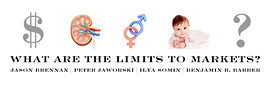Lead Essay
Jason Brennan and Peter Jaworski take on the critics of commodification. They first offer a typology of arguments against buying and selling otherwise licit items and actions. These critical arguments include claims of exploitation, misallocation, corruption, harm, and - likely the most controversial case - a class of objections that they term semiotic. Semiotic objections to market behavior claim that buying and selling can in some circumstances express wrongful attitudes. Brennan and Jaworski review examples of these arguments and show why in their view they are mistaken. They then offer a means by which they might be proven wrong; but so far, they say, no one has done it.
Response Essays
Benjamin Barber argues that free markets are a fiction. Democratic controls are everywhere, and these controls must also make markets just. That’s because markets can’t exist in a vacuum; they are constituted by laws, and these laws need to be instituted democratically. Many of the good things that we hope to achieve in market exchange cannot be had in any other way; this is particularly true of fairness. Individuals are poorly situated to make judgments about fairness or non-exploitation themselves, because their lives are suffused with power relations that predetermine what they will say and do. The democratic process has the potential to liberate them from these power relations.
Ilya Somin broadly agrees with Jason Brennan and Peter Jaworski that commodification is not a bad thing in itself. Yet he proposes to draw one very small area of exception: Citizens must not sell their votes, whether in elections or as members of a jury. The dangers of political corruption are simply too high, in that potential vote buyers are unlikely to pay people for good motives. Rather, they will act out of narrow self-interest and subvert representative government. This must not be allowed. In other cases, however, markets should be allowed to operate in one form or another.
Coming Up
Conversation through the end of the month.
Related at Cato
Book Forum: The Kidney Sellers: A Journey of Discovery in Iran, March 16, 2014

